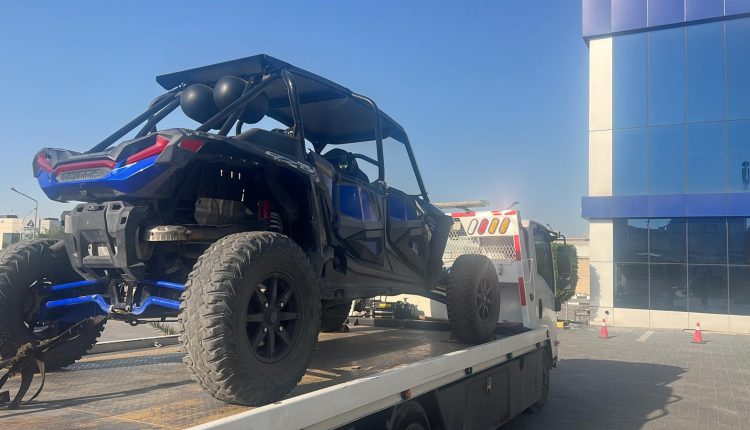Car Towing in Kuwait: Everything You Need to Know | Towing Kuwait 96665594
Introduction to Car Towing in Kuwait
Car towing in Kuwait is an essential service for motorists facing vehicle breakdowns, accidents, or other roadside emergencies.
Services Offered:
- Emergency Towing: In case of accidents or breakdowns, towing services are available round the clock to assist motorists.
- Roadside Assistance: Some towing companies offer roadside assistance such as jump-starting batteries, changing flat tires, and providing fuel delivery.
- Vehicle Recovery: Towing services can recover vehicles stuck in sand, mud, or other difficult terrains.
Call the number 96665594
Understanding the Car Towing Process
Understanding the car towing process is crucial for motorists to know what to expect in case of a breakdown or emergency situation. Here’s a detailed overview of the typical car towing process:
1. Assessment and Call for Help:
- Assess the Situation : If your vehicle breaks down, assess the situation to determine if it’s safe to stay where you are or if you need to move to a safer location.- Call Towing Service : Contact a towing company or roadside assistance service. Provide them with your location, the type of vehicle you have, and the nature of the problem.
2. Dispatch and Arrival of Tow Truck:
– Dispatch : The towing company will dispatch a tow truck to your location. The time it takes may vary depending on factors like your location and the availability of towing trucks.
– Identification : Make sure to provide clear landmarks or your exact location to help the tow truck find you easily.
3. Preparation for Towing:
– **Secure Personal Belongings**: Gather your personal belongings from the vehicle, especially if it needs to be towed to a repair shop.
– **Prepare the Vehicle**: Ensure that your vehicle is ready for towing. If possible, put the vehicle in neutral and release the parking brake. Follow any instructions given by the towing company.
4. Loading the Vehicle onto the Tow Truck:
– Vehicle Attachment : The tow truck operator will secure your vehicle to the tow truck using specialized equipment. This may involve attaching hooks or straps to the vehicle’s frame or wheels.
– Safety Measures : The operator will ensure that the vehicle is securely attached to prevent any movement during transportation.
5. Transportation:
– Tow to Destination : The tow truck will then transport your vehicle to the designated location, such as a repair shop, your home, or another specified destination.
– Safe Driving : The tow truck driver will drive cautiously, ensuring the safety of both your vehicle and other road users.
6. Unloading the Vehicle:
– Arrival at Destination : Once at the destination, the tow truck operator will carefully unload your vehicle from the tow truck.
- Payment and Paperwork : If there are any charges, payment will be settled, and any necessary paperwork will be completed.
Tips for a Smooth Towing Experience:
- Stay Calm : Keep a calm demeanor and follow instructions from the towing company.
- Communicate Clearly : Provide accurate information about your location and the condition of your vehicle.
- Ask Questions : Don’t hesitate to ask questions about the towing process, charges, and any other concerns you may have.
- Follow Safety Guidelines : Ensure that you and the tow truck operator follow safety guidelines throughout the process.
Understanding the car towing process can help alleviate stress during an already challenging situation and ensure that your vehicle is safely transported to its destination.
When Do You Need Towing Services?
You may need towing services in various situations where your vehicle is unable to operate safely or needs to be transported for repair. Here are some common scenarios when towing services are necessary:
1. Vehicle Breakdown:
- Mechanical Failure: If your vehicle experiences a mechanical issue such as engine failure, transmission problems, or brake failure, it may be unsafe to drive, requiring towing.
- Flat Tire: If you don’t have a spare tire or the tire cannot be safely changed on the roadside, towing may be necessary.
2. Accident:
- Collision: After a collision, especially if your vehicle is damaged and cannot be driven safely, towing services are essential to transport it to a repair shop or another location.
3. Out of Fuel:
- Running Out of Gas: If you run out of fuel in an area where refueling is not possible or safe, towing may be needed to transport your vehicle to a nearby gas station.
4. Vehicle Immobilization:
- Stuck in Mud or Sand: If your vehicle gets stuck in mud, sand, or snow and cannot be freed using conventional methods, towing may be necessary to pull it out.
- Flooded Roads: During floods or heavy rains, vehicles can become immobilized due to water damage. Towing may be required to remove the vehicle from the flooded area.
5. Electrical Issues:
- Dead Battery: If your vehicle’s battery dies and cannot be jump-started, towing may be necessary to take it to a repair shop for battery replacement or charging.
- Electrical System Failure: Issues with the electrical system, such as a malfunctioning starter or alternator, may require towing for repairs.
6. Overheating:
- Engine Overheating: If your vehicle’s engine overheats and needs immediate attention, towing may be necessary to prevent further damage.
7. Lockout:
- Locked Out: If you accidentally lock your keys inside the vehicle and cannot gain access, towing with specialized equipment may be necessary to unlock the doors.
8. Suspension Damage:
- Broken Suspension: Damage to the suspension system that makes driving unsafe may require towing to a repair facility.
9. Roadside Assistance:
- Roadside Services: Some towing companies offer roadside assistance for minor issues such as jump-starting batteries, changing flat tires, or delivering fuel.
In any of these situations, it’s important to prioritize safety. If you’re unsure whether your vehicle needs towing, it’s generally safer to err on the side of caution and call for assistance.



